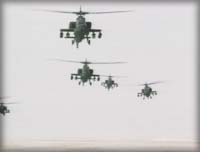 | |||||||
| |||||||
|
Does militant Islamic fundamentalism threaten the stability of both Saudi Arabia and the entire region? Can the U.S. still count on one of its most important allies in the Arab world? Here are excerpts from FRONTLINE's interviews with Brent Scowcroft, former U.S. national security adviser; Vali Nasr, an authority on Islamic fundamentalism; James Baker, former U.S. secretary of state; and Prince Bandar bin Sultan, Saudi ambassador to the U.S. They discuss the challenges confronting U.S.-Saudi relations.
Well, look, the Saudis are worried. They're very worried. Because Osama bin Laden is probably a deeper threat to Saudi Arabia, to Egypt, to Jordan, you name it, than to the United States. Osama bin Laden is going after us to get us out of the region, so he can deal with the regimes that he sees in the region, or replace them with purists. The Saudis are concerned. Are they corrupt? Apparently. Are they supporting us? Yes, of course, because they're more deeply threatened than we are. But, they're concerned because there's a lot of support in Saudi Arabia. Mubarak's predecessor, Sadat, was assassinated reviewing his own troops. Is it a problem for them? You bet. So, do they have to be careful? Do they have to appear to separate themselves, especially when we do things which popularly are a problem, whether it is the peace process, Iraq, Iran to the so-called "Arab street"? Sure. ...
Well, the facts are true. I don't think the fact that this is somehow some great cabal or conspiracy is true. I don't know if it's said as a cabal or a conspiracy. Secretary Baker, for instance, you can see people travel back-- You've been back to Saudi Arabia to do business, right? No. Well, Secretary Baker's done business there, or former President Bush has done business there. They're a close allies, and there's a lot of U.S. trade. That's one of the reasons they go back and forth. Well, of course, but there's nothing wrong with that. No, but some people would say it makes us closer to the established regime. Well, I see no reason we should try to distance ourselves from the established regime. Is it our kind of system? No. But, it's their kind of system. They are gradually changing. Are they changing the way we would like? I don't think that that ought to be our primary concern, especially not at this particular moment.... ... So, some of this problem is a cultural problem that infests a lot of our society, in general. Yes, and we have great cultural differences with Saudi Arabia. So, they're our ally because you believe that they support the same interests basically that we have. And it's an important ally as long as we're this dependent on their oil? Yes. But, I think they are a genuine ally as well. It's a troubled ally. It's a state in transition between Middle Ages and modernism, grappling with its religion, and so on and so forth. You know, this is the way Turkey used to be before Ataturk came in and said "No, religion has its place but it's not part of the government." And ruthlessly established a democracy. You know, different people are going to react different ways. And I don't think we should be intolerable because people do things a little differently.
Now the fact is that, previously in history, there have been foreign troops is correct. The United States is, in fact, singularly responsible for the creation of Saudi Arabia. There's no country in the Middle East with which we are as intertwined as Saudi Arabia. American oil companies ensured the rise of the Saud family, ensured the dominance of Saud family over Saudi Arabia. The very fact that the Peninsula was integrated together into one single kingdom, one single nation state, has a lot to do with U.S. presence in the country. ... ...... I'm going to meet with former Secretary of State and Secretary of the Treasury, James Baker, who for instance, was heavily involved in the sale of the F-15, F-16 fighters just before he left office in 1992. He has returned to the region, as a lobbyist, if you will, for various groups, like the Carlyle group. What should we ask him? Well, we should ask him, where are we going with Saudi Arabia? This is a country that's under tremendous amount of stress. Sept. 11 has exposed contradictions and massive fissures in its relationship with its society that we were unawares about. And now are those exposed. It's not business as usual. What are we investing in? What are we investing, in terms of our own image, in the region? We're rapidly approaching an era that Jimmy Carter may well have been right, that Iran is the island of stability in the region. Look around. I mean Pakistan, Afghanistan, Iraq, Saudi Arabia. Do we want to be holding the bag again when there's a massive eruption? Do we have a game plan? Do we have an endgame here? How are we going to help Saudi Arabia with the soft landing? We will no longer work to ignore the problems and the forces and the linkages and the relationships that we're seeing as the trouble that's facing us. ... Fundamentally, what you're saying is, that the Saudis have been spending money basically fostering this warped view of the world? They've been spending money on promoting a very conservative and fanatical view of Islam. The consequences may have not been thought of ahead of time. But the result is the increasing entrenchment of rigidity and fanaticism in the Muslim world, which make its entire relationship with all aspects of the West, of modernity, of its political existence, of its economics, all of that difficult. And then when you have crisis like the Arab-Israeli crisis or wars, it plays into that.
In my view, if you accept as a premise that we must have access, easy access, to the energy reserves of the Persian Gulf, I don't see how it makes sense for the United States to say we're no longer going to support the government of Saudi Arabia, which enables us to do that. But I think what people are saying is, we're so in bed with them in terms of getting them to invest money in the United States and so forth, and that we deal with the royal family. We don't deal with the realities of the country itself. What do you mean by that? We deal with the royal family, but not with the realities of the country? What does that mean? People point out that we say they're our ally, but then we don't object when their fundamentalist side of their country goes ahead and proselytizes anti-Americanism. In foreign and security policy, when you deal with a country, you deal with the government of that country. What are we supposed to do? Deal with the man on the street? You deal with the government. That happens to be the government. If it's got warts on it, it has warts on it. But we have a fundamental national security interest, as I have said to you about eight times on this program. Don't lose sight of it. It is important to the United States. It is important to our economy. It is important to a whole host of other things. So we deal with a government that's not perfect. But we do that all around the world. ...
I think Saudi Arabia has a problem. And because of the unique closeness of relations between us and Saudi Arabia, we've got a problem with them, which we have to solve. The terrorists [of] Al Qaeda and Osama bin Laden are a direct threat -- not only to the United States -- but even more so to the House of Saud. And they have tried to deal with it by exporting it. They didn't want Osama bin Laden back when the Sudanese offered him up about three years ago. The bin Laden family is a powerful family in Saudi Arabia, as is well known. And the Saudis have been sitting on a lot of internal contradictions for a long time. But for the time being -- and I need to stress this -- I think that any effort by the United States to undermine the Saudi royal family would backfire. It would create more anarchy, more chaos, and we need to be very careful about what we do in a situation which would not be benefited by additional instability in the region. As for the long-term situation in Saudi Arabia, that's a significant problem to which I don't have an easy solution. One solution people are talking about is that we have less dependence on oil. Then we wouldn't have to worry about them. If you believe, as I do, that our problems should be less dependence on oil, foreign oil, then the one president in our lifetime who really attacked this problem head on was Jimmy Carter with his Project Independence. And that project, which was designed to reduce our dependence on foreign oil over a 10-year or 20-year period, was abandoned the minute his successors took power in 1981. I think that was a great tragedy. ...
It's almost as deja vu again. We heard the same stories, the same pontification from people who ... are against the kingdom, against its policies. In 1990, we were told ... that if the Americans come to help Saudi Arabia defend itself and liberate Kuwait, the Arab world will rise from the Atlantic to the Gulf. Because? Because the infidels have come, because Saudi Arabia is a holy land. Well, the truth of the matter, one, the premise was wrong. America has never been a colonizing power as far as we were concerned. Our relationship with America did not start in 1990. It started in the 1930s. And when the Americans came to Saudi Arabia, they didn't come as an invader. They came actually as a private sector, trying to help us find oil. They found the oil for us, and they've been our friends ever since. ... .... For us in Saudi Arabia, we are extraordinarily sensitive to our people's feeling. ... My family has been in leadership position since 1747. Now, you can call us many things, but politically stupid we are not. And we make our decisions based on one simple fact. Does it sound good [in] downtown Riyadh or not? We don't ask ourself does it sound good on CNN, or downtown Washington, or London, or Washington Post. ... We are constantly keeping our thumb on the pulse of our people. .... When we came to investigate the Khobar bombing, our law-enforcement people said they weren't getting cooperation from the Saudi government, they weren't being allowed to interview people to get to the bottom of this. And [FBI Director Louis] Freeh himself made a point of not leaving office until he was sure he could get some indictments. What happened there?
I never found the complaints from our allies in the West as damaging politically to Saudi Arabia. I always thought that is an asset. The more Americans complain, or the Europeans, that we are not cooperating on internal matters, the more you give me strength with those -- with my people, and with the dissidents -- that we are not in the pocket of anybody. We are your friends. We respect you. We like you to respect us. But there are lines after which we are not gonna compromise. So what happened there is simple. It is the same friction as you have between the FBI and the CIA. Security services, or intelligence services, are very jealous about what they do. And our people have to go at the end of the day, once the investigation, to Sharia law court. ... A religious court. When they go there they must make sure from the court perception that the information is not contaminated by foreign influence. Because, if that victim, if the accused says, "But I challenge this evidence because foreigners gave it all," we lose the case in our court. That guy goes out free. So, there was a method unto that madness, that's number one. Number two, it was a National Security matter for us. There are things that you know you don't tell us. There are things we know we may not tell you, unless we know what is the extent of them. If we wanted to see the big picture before we shared it with you. And when it was all done, we shared what is necessary with you.
home · introduction · interviews · analyses · haroun fazul · chronology photo copyright © afp/corbis | |||||||

 There are those people who say our relationship with Saudi Arabia has become
symbiotic. Not only that we are dependent on their oil, but we are also
dependent on selling them-- the administration you worked for sold them all
kinds of fighter jets, which helped us in many ways decrease our unit cost. And
this last administration pushed them to buy Boeing airliners for their airline
help, aircraft manufacturer. That basically we've tried to recycle the
petrodollars and use these Saudi princes to do that. Is it true?
There are those people who say our relationship with Saudi Arabia has become
symbiotic. Not only that we are dependent on their oil, but we are also
dependent on selling them-- the administration you worked for sold them all
kinds of fighter jets, which helped us in many ways decrease our unit cost. And
this last administration pushed them to buy Boeing airliners for their airline
help, aircraft manufacturer. That basically we've tried to recycle the
petrodollars and use these Saudi princes to do that. Is it true? I am glad you mentioned this. Because bin Laden has dissidents, friends, who
are saying [that] we were in Louis Freeh's pocket, we actually had the FBI here
and they were telling us what to do, and the Americans came to our country to
arrest our dissidents. ...
I am glad you mentioned this. Because bin Laden has dissidents, friends, who
are saying [that] we were in Louis Freeh's pocket, we actually had the FBI here
and they were telling us what to do, and the Americans came to our country to
arrest our dissidents. ...